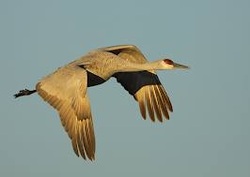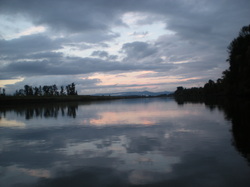
Searching for Sandhills
It’s time for southern migration in the Pacific Northwest. Our family has
watched the Vaux Swifts move through Portland every September for the past seven years. A sense of magic fills the evening as hundreds of locals view thousands of little birds as they whisk through the sky in swirling clouds and dive into the Chapman School chimney on their way to delicious southern insects and warm winter digs.
I recently had this feeling in my bones that there were also migrating Sandhill Cranes hovering in the countryside, and I wanted to see them. I had watched them from afar on Sauvie Island a few years ago, but I wanted to be more up-close and personal.
On Tuesday we headed to the National Wildlife Refuge in Ridgefield,
Washington, a favorite spot of ours where last spring we identified thirty-seven different birds from our car.
Alas! Due to the government shutdown, we couldn’t get in.
Where were those cranes? Were they all huddled behind the closed gates of
the refuge? Surely not.
We went to Vancouver Lake to try our luck. Purposely uncut rows of corn
in a field just for cranes were not luring in my friends on this rainy day,
although I might have spotted one leaving the area.
Heading for home, we stopped for one last look at the Columbia River
and a sandy inlet leading into the lake. I heard a diesel truck engine idling
nearby and thought it odd that, when I turned around, I saw no truck. Then I looked up. The sound was coming from thousands and thousands of geese and ducks and cranes and even crows, soaring and whirling and diving and hovering and banking over the surrounding fields. It was astounding. Then, over our heads, I saw a half dozen huge flapping brown paper bags gliding by headed toward the noisy mayhem in front of them. Majestic and determined, the Sandhill Cranes moved fast. They quickly melded with the others – an indecipherable, blended mass of seeming chaos with a message beyond my understanding.
For me, it was an unexpected, delightful wonder. Despite politics, some
shows can’t be stopped.
It’s time for southern migration in the Pacific Northwest. Our family has
watched the Vaux Swifts move through Portland every September for the past seven years. A sense of magic fills the evening as hundreds of locals view thousands of little birds as they whisk through the sky in swirling clouds and dive into the Chapman School chimney on their way to delicious southern insects and warm winter digs.
I recently had this feeling in my bones that there were also migrating Sandhill Cranes hovering in the countryside, and I wanted to see them. I had watched them from afar on Sauvie Island a few years ago, but I wanted to be more up-close and personal.
On Tuesday we headed to the National Wildlife Refuge in Ridgefield,
Washington, a favorite spot of ours where last spring we identified thirty-seven different birds from our car.
Alas! Due to the government shutdown, we couldn’t get in.
Where were those cranes? Were they all huddled behind the closed gates of
the refuge? Surely not.
We went to Vancouver Lake to try our luck. Purposely uncut rows of corn
in a field just for cranes were not luring in my friends on this rainy day,
although I might have spotted one leaving the area.
Heading for home, we stopped for one last look at the Columbia River
and a sandy inlet leading into the lake. I heard a diesel truck engine idling
nearby and thought it odd that, when I turned around, I saw no truck. Then I looked up. The sound was coming from thousands and thousands of geese and ducks and cranes and even crows, soaring and whirling and diving and hovering and banking over the surrounding fields. It was astounding. Then, over our heads, I saw a half dozen huge flapping brown paper bags gliding by headed toward the noisy mayhem in front of them. Majestic and determined, the Sandhill Cranes moved fast. They quickly melded with the others – an indecipherable, blended mass of seeming chaos with a message beyond my understanding.
For me, it was an unexpected, delightful wonder. Despite politics, some
shows can’t be stopped.


 RSS Feed
RSS Feed